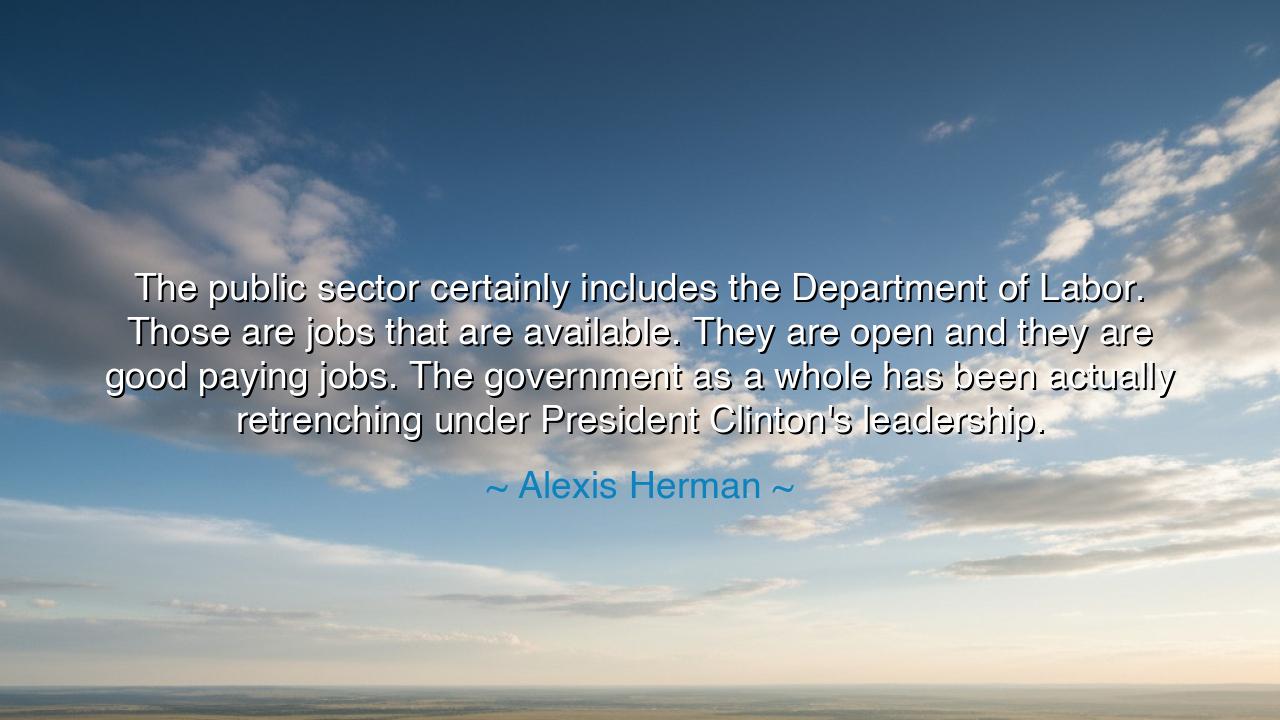
The public sector certainly includes the Department of Labor.
The public sector certainly includes the Department of Labor. Those are jobs that are available. They are open and they are good paying jobs. The government as a whole has been actually retrenching under President Clinton's leadership.






Hear the words of Alexis Herman, who once served as steward of labor in the land, and who declared: “The public sector certainly includes the Department of Labor. Those are jobs that are available. They are open and they are good paying jobs. The government as a whole has been actually retrenching under President Clinton’s leadership.” Though spoken in the cadence of policy, these words hold a truth deeper than the workings of politics: they speak to the dignity of work, the responsibility of government, and the power of leadership to shape the fate of nations.
What is the public sector but the arm of the people themselves, built to serve, protect, and sustain? It is not a distant abstraction, but the living web of jobs that carry justice into reality—teachers guiding the young, inspectors ensuring safety, clerks maintaining the records of law, and workers within the Department of Labor safeguarding the rights of those who toil. Herman reminds us that these roles are not gifts of charity, but foundations of the common good. They are open, they are available, and they carry with them not only wages but the pride of service.
And yet she speaks also of retrenchment—of the government drawing back, of its weight lightened, of its role reduced under Clinton’s leadership. This is not merely a note of economics, but a reflection of the eternal rhythm of governance: sometimes the state expands to shelter the people; sometimes it contracts to demand more of individual enterprise. The balance between the two has ever been a matter of fierce debate, from the assemblies of Athens to the senates of Rome, from the town halls of America to the modern councils of nations.
History offers us an image of this truth in the days of Franklin Delano Roosevelt. In the Great Depression, when hunger stalked millions, it was the public sector that rose to meet the crisis. Through the Works Progress Administration, through Social Security, through the protections of the Labor Department, the government became not only a regulator but a lifeline. Those jobs gave bread to the hungry and dignity to the broken. It was a time when expansion was salvation. Herman’s words, spoken generations later, acknowledge both the strength of such roles and the shifting winds of political vision.
The meaning of her statement is clear: leadership must discern the role of the public sector, neither suffocating nor abandoning the people. It must ensure that where there are jobs, they remain not hidden treasures but open doors, accessible to all who would labor honestly. And it must remember always that the dignity of a people is measured not only in wealth amassed, but in the fairness and availability of work.
The lesson for us is simple yet profound: never look lightly upon the work of the public sector, for it is the unseen scaffolding that upholds the life of the nation. Respect the teachers, the civil servants, the protectors of law, the guardians of labor rights—for in their steady efforts lies the security of millions. And when retrenchment comes, let it be done with wisdom, never at the cost of the most vulnerable.
What actions then should we take? Seek first to honor all forms of honest work, whether private or public. Support policies that ensure fairness and opportunity in jobs. Recognize that the government, though imperfect, is an instrument built by the people for their own welfare. And above all, remember that leadership is judged not by words alone, but by how it preserves the dignity of labor and the wellbeing of those who serve and are served.
Thus let Herman’s words be carried forward: the public sector is no relic, but a living force in the life of society. It provides jobs, it safeguards dignity, it reflects the vision of leadership in every age. Honor it, support it, and let it remain a servant of the people, so that all may share in the common good.






AAdministratorAdministrator
Welcome, honored guests. Please leave a comment, we will respond soon